Power failures can be annoying at best and life-threatening at worst. Even more concerning, power failures and surges only seem to be getting more frequent than they were a decade or two ago. These issues can significantly affect your business schedule, not to mention your day-to-day life.
For this reason, a UPS system can be a great way to obtain consistent power and protect sensitive equipment in case of a power shortage. In this article, we’ll thoroughly compare APC vs CyberPower, two industry-leading UPS (Uninterruptible Power Supply) manufacturers, to determine which delivers the best battery backup solution for your home and business.
APC vs CyberPower – Quick Comparison
APC
APC is the older company in this APC vs CyberPower comparison, as it was founded in 1981, sixteen years earlier than CyberPower. Started in the garage of an optimistic tech-head, APC grew into the flagship brand of Schneider Electric and one of the industry leaders in physical infrastructure and software solutions.
The manufacturer produces various tools and services, ranging from UPS systems to cooling equipment and security and environmental monitoring tools. With that in mind, in the context of this APC vs CyberPower comparison, we’ll primarily focus on the company’s UPS units. Let’s take a closer look at the biggest advantages and disadvantages of APC products:
Pros:
- Some very advanced power backup solutions
- Excellent runtimes
- Dependable surge protection
- Impressive interference filter
Cons:
- Generally more expensive than CyberPower units
- Shorter warranty on batteries
CyberPower
CyberPower is one of the leading manufacturers of budget UPS units. Founded in Minnesota in the United States in 1997, it’s the go-to choice for homeowners and many businesses looking for an affordable and reliable unit. Almost two and a half decades later, CyberPower operates more than a hundred distributors and retail locations globally.
The company won Data Center 100 and Top 20 Infrastructure Provider by CRN three times since 2014. It has also been named Best UPS by multiple sites and publications, most notably PC Gamer and ChannelPro. Here are some of CyberPower’s most significant pros and cons:
Pros:
- Intuitive scheduling settings
- New Smart App Sinewave feature
- Reliable
- Three-year warranty on units and batteries
Cons:
- Slightly less reliable than APC products
- Short supported runtime
APC Uninterruptible Power Supply
Function and Performance
APC’s Uninterruptible Power Supply (UPS) guarantees power protection and stability for connected electronics. Its main function is to provide clean battery power and protect sensitive equipment during power interruptions or fluctuations.
Generally speaking, APC UPS units are considered one of the best budget-friendly products and offer stable and reliable performance for the price. To see how this translates through specific features, we’ll review the following aspects:
Number of Outlets
The number of available outlets on each APC unit varies between models. Nevertheless, most APC systems come with ten outlets. This usually includes six surge protectors with battery backup and four outlets with surge protection only or five of each of these outlets.
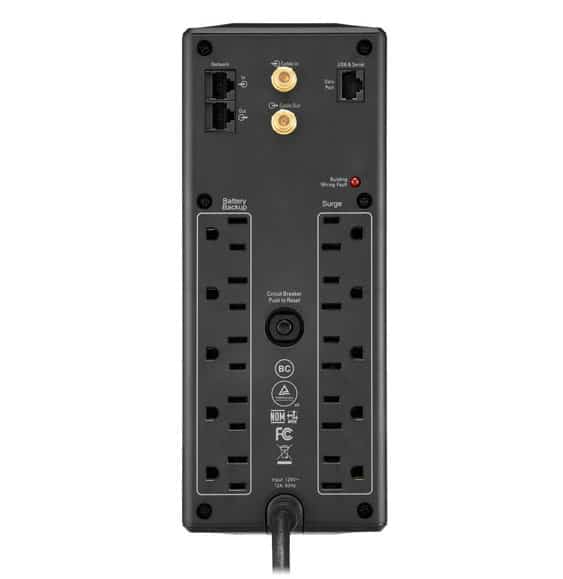
Minutes of Back-Up Power
The runtime of APC’s UPS units isn’t uniform across all of the brand’s products. Instead, it primarily depends on the APC model itself. More specifically, it’s dependent on the unit’s overall volt-ampere capacity. Looking into the numbers, the most powerful APC unit has a listed runtime of one hour and seventeen minutes. On the other end of the spectrum, the least powerful APC system delivers around half an hour of backup power.
Cable Length
Cable length is undoubtedly one of the most important factors to consider when setting up a UPS system in your home or business. With this in mind, APC units offer good support, as you can choose between two supported cable lengths on their website. More precisely, their smart signaling cables come in six feet and fifteen feet options.
Connected Equipment Guarantee
APC UPS units have an amazing lifetime guarantee on their connected equipment. Moreover, these guarantees can cover some jaw-dropping amounts, depending on what APC model you get. With that in mind, the connected equipment guarantees can range from $25,000 on the BK 500BLK up to half a million dollars for one of their BR 1350MS models.
Remote Management
APC has created a next-gen Smart-UPS remote management system that makes remote UPS monitoring more accessible than ever before. The intuitive Smart-UPS sends automatic notifications, firmware updates and enables you to view your UPS unit’s status through a secure web portal. This impressive monitoring feature gives APC the edge over CyberPower for the overall user experience when remotely managing the units.
Design
APC UPS systems have a streamlined and minimalistic design with several control buttons on the unit. They are rectangularly shaped and usually very narrow so that they can fit great in corners and tight spaces. APC units commonly include a large LED display and front-facing USB ports.
Features
AVR
AVR (Automatic Voltage Regulation) technology is essential for maintaining the unit battery. This is because it increases or reduces the voltage to a safe operating range instead of employing the battery when it is too high or too low.
Many APC product lines like Line-R, Back-UPS, Back-UPS PRO, Smart-UPS, and APC AV offer AVR protection. AVR’s main advantages are prolonged battery life and extended operating range.
Scheduling
APC units have convenient scheduling settings that allow you to set when you want your unit to work or sleep, based on any power issues you might be expecting. The entire scheduling process for APC systems is done through the Device Manage Menu and takes only a few seconds.
Fault Detection
APC’s products come with BWF (Building Wiring Fault) or SWF (Site Wiring Fault) indicators that light up when the device notices any presence of at least one electrical wiring issue. This fault detection system is reasonably robust, as it can detect missing or loose ground, reverse polarity, an overloaded neutral, and other wiring problems.
Ethernet Surge Protection
APC’s ProtectNet standalone surge protector offers excellent protection from damaging surges. It’s compatible with PoE (Power over Ethernet) and 10/100/1000 Base-T networks. To put it simply, it has strong protection against power spikes, wiring faults, and lightning. It also includes a SurgeArrest failsafe feature which automatically disconnects all equipment from the power supply, preventing any excess voltage from reaching it.
Interference Filter
APC’s power interference filter is better than the one CyberPower offers, as it delivers best-in-class protection against surges, power spikes, and even lightning. The interference filter also improves sound and video quality by eliminating noise interference.
This interference filter also supports multiple mounting methods, allowing convenient use in different environments. With the APC interference filter, you can count on outstanding performance and reliable protection.
Price
Price-wise, APC ranks somewhere in the middle. It’s not as expensive as some premium UPS units like Eaton but still costs more than models from other budget brands like CyberPower. More precisely, you can get a robust APC UPS starting at around two hundred dollars and up. Additionally, APC UPS systems come with a three-year warranty, excluding the batteries, which have a two-year warranty.
Recommended APC Uninterruptible Power Supply
APC is primarily known for its line of basic, utilitarian uninterruptible power supply units that come with an affordable price tag. With that in mind, here are a couple of APC UPS units worth your attention:
APC UPS 1500VA
With ten outlets, five of which with battery backup, the APC UPS1500VA is a very practical UPS for every home. It has a 100W runtime of just under an hour and ten minutes and a handful of smart features. These include a clean and sleek LCD display, automatic voltage regulation, and a data line surge guard. Other convenient traits you can count on are NEMA 5-15P and free Windows PC power-management software.
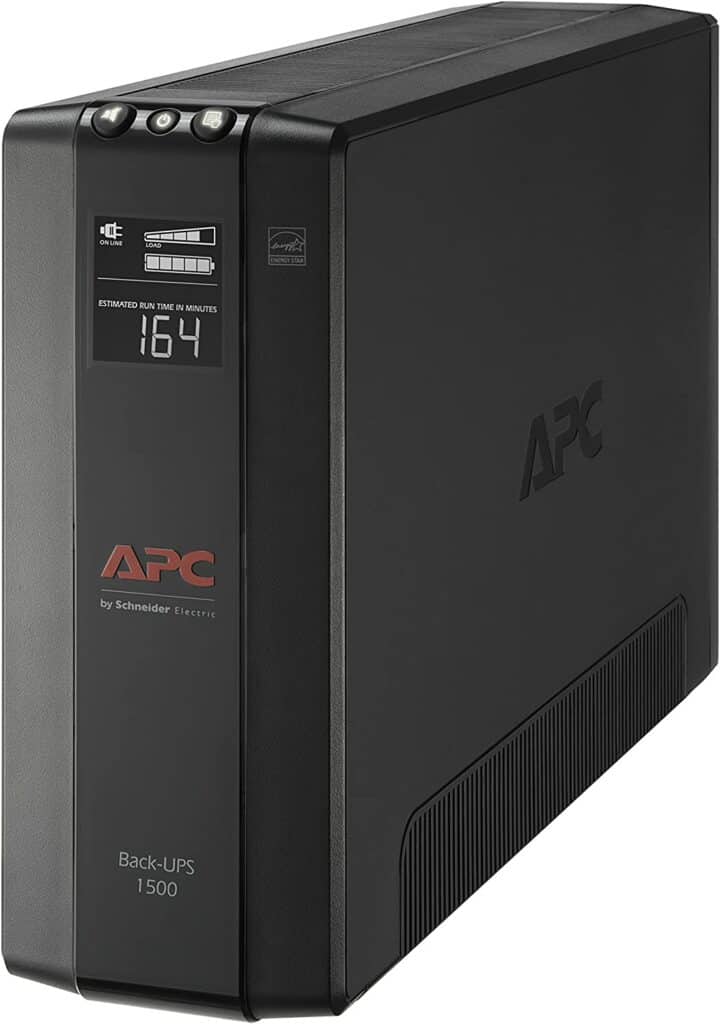
APC UPS 1500VA Sinewave
This 1500VA/900W UPS backup power supply comes with ten outlets, six of which have surge protection with battery backup. This is a Sinewave UPS with an automatic voltage regulation feature, so it’s great for high-end electronics.
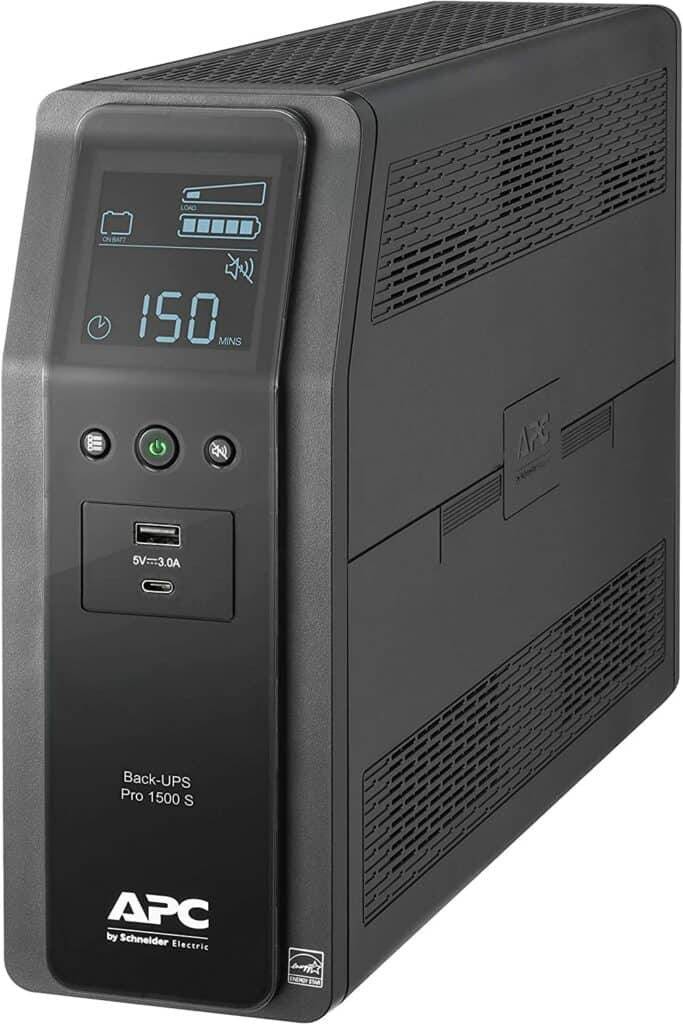
It has a 100W runtime of just over an hour and fifteen minutes. Additionally, this particular model features an easily replaceable battery, a USB-C charging port, and a Type-A charging port.
CyberPower Uninterruptible Power Supply
Function and Performance
CyberPower USP units find themselves fairly similar to APC systems, so there’s no use comparing their general function and performance characteristics. That said, to determine how CyberPower units differ from APC ones, we’ll also examine them through a handful of performance features:
Number of Outlets
While APC has the edge over CyberPower in several key categories, the overall number of outlets is undoubtedly not one of them. This is because CyberPower offers an equal or greater number of outlets than APC. For example, you can find units like CP1500AVRLCD, which has six battery and surge-protected outlets and six surge-protected outlets, making twelve in total.
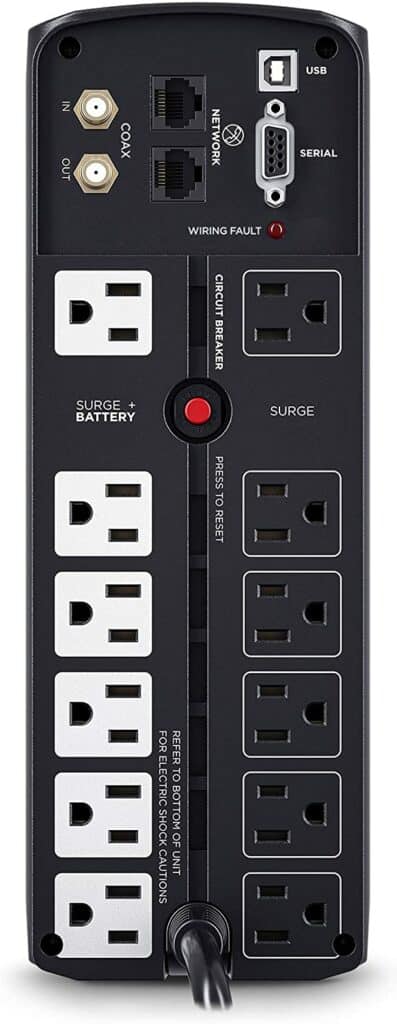
Minutes of Back-Up Power
We were surprised to see just how far behind CyberPower is in this category. CyberPower units last ten to fifteen minutes under half load and less than five minutes under full load. Knowing this, we can confidently say that APC heavily outperforms CyberPower in terms of total minutes of backup power.
Cable Length
Supported cable length is another category in which APC has a slight advantage over CyberPower. While CyberPower offers a varied selection of cables for different purposes on its website, there are no cables as long as those that APC provides. The available Firewire and Parallel Cables are only obtainable in lengths of six feet and ten feet. That said, there are Cat6 cables up to twenty-six feet long.
Connected Equipment Guarantee
CyberPower offers very similar connected equipment guarantee payouts as APC, with costs scaling based on the USP unit’s volt-ampere rating. Like APC systems, the more affordable CyberPower units with less power have a connected equipment guarantee between $25,000 and $75,000. In contrast, the most expensive and robust CyberPower units cover up to half a million dollars.
Remote Management
CyberPower produces remote management cards that allow convenient configuration and management through a supported browser or network management system. The advanced sensors that come with CyberPower’s UPS systems monitor and provide real-time data readings of any environment you set them in.
Design
Although design certainly isn’t among the most crucial aspects of a quality UPS, some differences between APC and CyberPower are worth considering. Most CyberPower units are box-shaped and heavier. Moreover, CyberPower units generally include more controls and a smaller LED display, although you can also find models with a design similar to APC systems.
Features
AVR
CyberPower’s AVR systems come in compact form and mini-tower form. Compact units have a lower volt-ampere capacity, ranging from under 700 VA up to 900 VA. That said, they are also more affordable. In contrast, the manufacturer’s mini-tower units are a bit pricier but offer more powerful volt-ampere capacity, going up to 1500 VA.
Although their specific physical characteristics can vary, all CyberPower AVR units include data line protection, energy-saving GreenPower setting, and management software. Considering all of this, CyberPower has an advantage over APC in terms of AVR support.
Scheduling
Although APC units have an excellent scheduling system, we give CyberPower the edge in this category. The most significant reason for this is that CyberPower’s in-house PowerPanel Personal platform offers a more in-depth and on-hand approach compared to APC. CyberPower’s schedule features a layout every week, enabling you to set a schedule for your UPS and connected equipment up to seven days in advance.
Fault Detection
There’s not much room for differentiation between the two brands’ products when it comes to fault detection properties. CyberPower’s UPS units also feature a wiring fault indicator that illuminates red if there’s a wiring issue somewhere in the connection.
In the case of wiring fault detection, you can rely on CyberPower technical support, which is very prompt and efficient in assisting users with such problems.
Ethernet Surge Protection
CyberPower’s ethernet surge protectors vary by product type, family, and specific model. More precisely, you can pick from a diverse lineup divided into categories like Essential, Home Office, Professional, Premium, and many others.
The sheer quantity of surge protectors in their lineup gives CyberPower the edge in this category. Furthermore, CyberPower offers a lifetime warranty on surge protectors and guarantees on the connected equipment.
Interference Filter
CyberPower’s interference filter delivers solid results, although it falls slightly behind APC’s filter. Still, it has a very good surge energy capacity and offers respectable all-around network protection. It also comes with EMI/RFI noise filters and two-prong and three-prong compatibility to ensure compatibility with a wide range of electronic devices.
Price
CyberPower UPS units have the edge over APC in this category, as they are a bit cheaper than APC systems and offer many comparable features. Moreover, CyberPower offers a three-year warranty on its units, which in this case, also includes a full warranty on the batteries for the duration of the entire warranty.
Recommended CyberPower Uninterruptible Power Supply
CyberPower manufactures a long list of surge protectors, UPS, and UPD products, so narrowing down a few recommended power supply units is a difficult task. That said, here are two excellent CyberPower uninterruptible power supply units:
CyberPower PR1500LCD
The PR1500LCD is one of the most impressive UPS systems in CyberPower’s lineup. Although this model comes with batteries from 750VA and up to 3000VA, the 1500VA delivers more than enough juice. It comes with eight outlets and USB/serial communication ports.
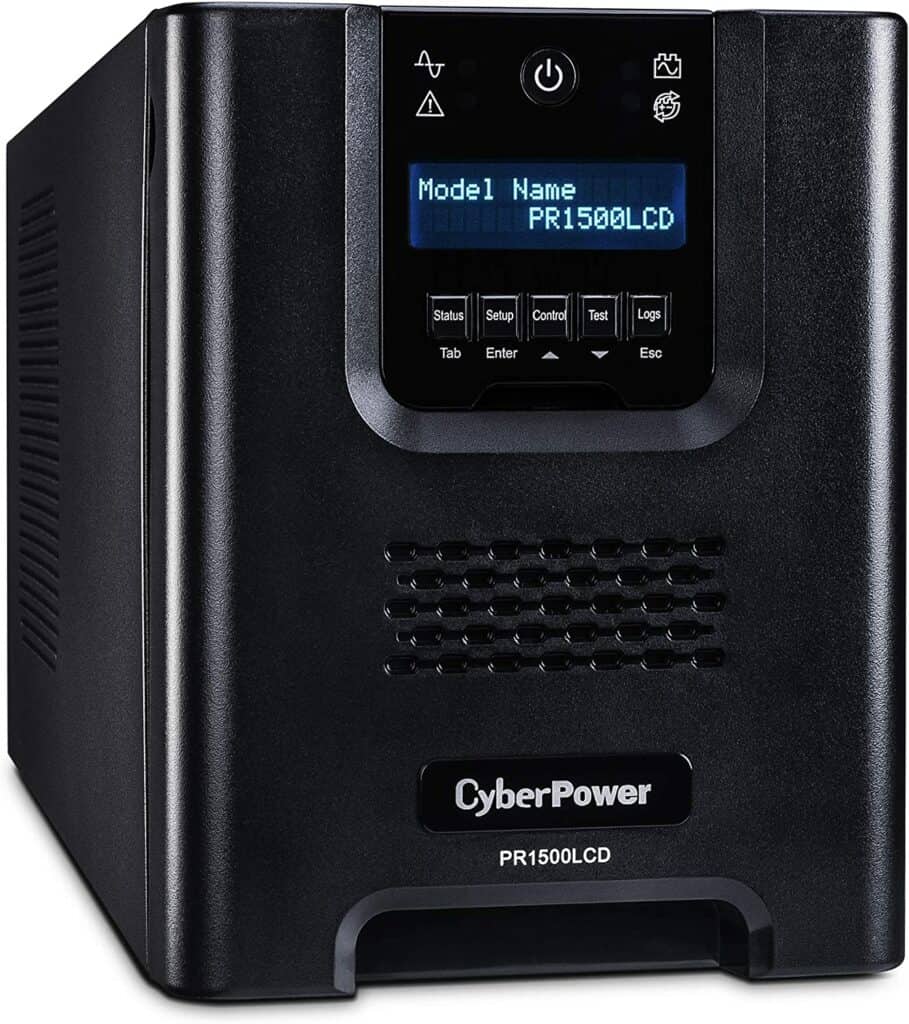
This power supply has AVR, which can correct minor power fluctuations without switching to battery power. It also has a convenient smart app UPS system with a multifunctional display, enabling great control and remote monitoring.
CyberPower CP1500AVRLCD
The CP1500AVRLCD is the ideal power supply for an average user. It features a 1500VA/900W intelligent LCD battery and 12 NEMA 5-15 outlets, six of which have both battery backup and surge protection, and six with only surge protection. Weighing exactly twenty-five pounds, this unit includes advanced features like automatic voltage regulation and has a multifunction LCD panel that displays detailed information on a handful of aspects.
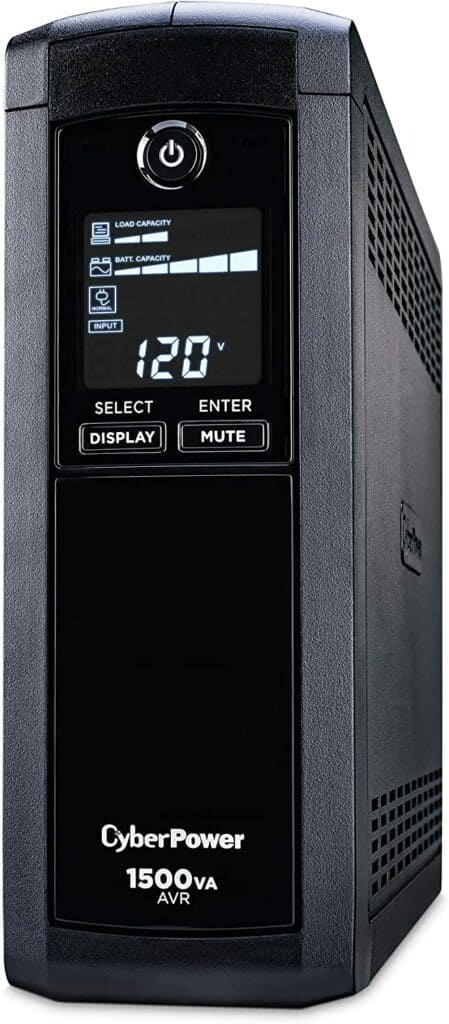
Conclusion
To sum up this APC vs CyberPower comparison post, we can say that these two companies are among the leading manufacturers of UPS, surge protectors, and PDUs. Both brands offer reliable equipment protection and solid runtimes in power failures. That said, APC products are slightly better than CyberPower products, although the latter brand still holds its ground very well.
If you’re deciding between the two, the best rule of thumb would be to use CyberPower for desktop computers and generally non-production equipment. On the other hand, we recommend using APC for all other critical equipment you’re running, as APC units will deliver a bit better performance across the board.